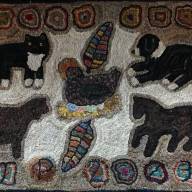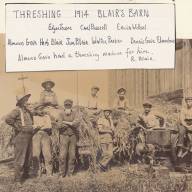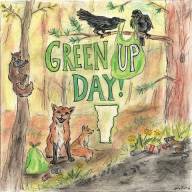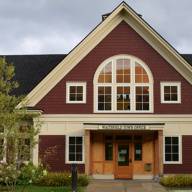Some black bears leave their dens to walk around, stretch their legs and then go back to sleep. Other bears leave dens for good. Bears emerge skinny, groggy and thirsty and soon go looking for roughage. Newborn black bear cubs keep growing in their dens. Yearlings that denned up with mom last fall celebrate their first birthday. Bears get new "shoes."
THE BEAR SNOOZE ALARM
Hibernating bears may temporarily leave their dens and do a short walk-about before curling up and going back to sleep. Bedding in the den might be several inches of grasses, moss, leaves, pine needles and tree branches.
LEAVE DENS FOR GOOD
In March many full-grown male bears begin to emerge from their winter dens. Bears that denned up in poor condition and survived the winter may also leave their dens. Why would a bear den up in poor condition? It might be injured, or a freeze or wildfire damaged acorns and berries and made it tough to pack on the pounds needed to stay healthy all winter.
SKINNY, GROGGY AND THIRSTY
Since bears can lose more than 30% of their body weight over their long winter's fast, you'd think they'd make a beeline for the nearest food source. But most bears emerge drowsy and lethargic and spend their first few days drinking lots of water, eating snow if there is no water available and cleaning out their systems before starting to prowl around searching for food. It's not uncommon for bears to continue to lose weight the first few weeks they are back out into the world.
Bears will soon be nibbling on plants that provide some roughage and help clear their kidneys and digestive system (what people think of as fiber, and for the same reason). Bears eat lightly at first and look for old berries, rose hips and acorns along with winterkill carcasses. Eventually bears will go in search of more substantial meals, so now is a good time to make sure anything around your home and property that could possibly attract a hungry bear is stored out of sight, smell and reach.
BLACK BEAR CUBS
By six weeks old bear cubs have more than doubled their birth weight and weigh about 2 pounds. Black bear cubs' bright blue eyes open (they'll turn brown later) and their sharp little teeth and claws emerge. Cubs may begin to crawl around a bit inside the den. Fun fact: both eyes don't always open at the same time.
YEARLINGS CELEBRATE FIRST BIRTHDAY
Most bear cubs born last spring denned up with their moms. A mother bear and two or three half-grown cubs can make for a snug fit inside a den, but everyone stays warm. No birthday treats though; yearlings must live off their fat reserves just like adult bears. Black bear families will stay together until the end of May or early June when cubs will strike off on their own. Grizzly bear cubs typically stay with their moms for two or three winters.
BEARS GET NEW SHOES
A bear's thick paw pads often slough off over the winter (think of a really good pedicure) and get replaced with nice new ones. All bears have relatively flat feet and tend to be a bit pigeon-toed. Their paw pads are tough and get quite a workout when bears are active, so no wonder they need new "shoes" from time to time.
Information from http://www.BearWise.org
The MRV Bear Initiative is a working group represented by conservation organizations in Duxbury, Fayston, Moretown, Waitsfield and Warren, Friends of the Mad River, the Stark Mountain Foundation, and Sugarbush Resort. The goal is to collectively improve how community members coexist with black bears. More information at https://www.madrivervalley.com/stewardmrv/living-with-bears/












